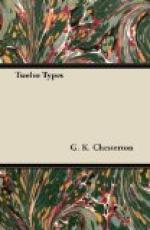The new collection of ‘Tales from Tolstoy,’ translated and edited by Mr R. Nisbet Bain, is calculated to draw particular attention to this ethical and ascetic side of Tolstoy’s work. In one sense, and that the deepest sense, the work of Tolstoy is, of course, a genuine and noble appeal to simplicity. The narrow notion that an artist may not teach is pretty well exploded by now. But the truth of the matter is, that an artist teaches far more by his mere background and properties, his landscape, his costume, his idiom and technique—all the part of his work, in short, of which he is probably entirely unconscious, than by the elaborate and pompous moral dicta which he fondly imagines to be his opinions. The real distinction between the ethics of high art and the ethics of manufactured and didactic art lies in the simple fact that the bad fable has a moral, while the good fable is a moral. And the real moral of Tolstoy comes out constantly in these stories, the great moral which lies at the heart of all his work, of which he is probably unconscious, and of which it is quite likely that he would vehemently disapprove. The curious cold white light of morning that shines over all the tales, the folklore simplicity with which ‘a man or a woman’ are spoken of without further identification, the love—one might almost say the lust—for the qualities of brute materials, the hardness of wood, and the softness of mud, the ingrained belief in a certain ancient kindliness sitting beside the very cradle of the race of man—these influences are truly moral. When we put beside them the trumpeting and tearing nonsense of the didactic Tolstoy, screaming for an obscene purity, shouting for an inhuman peace, hacking up human life into small sins with a chopper, sneering at men, women, and children out of respect to humanity, combining in one chaos of contradictions an unmanly Puritan and an uncivilised prig, then, indeed, we scarcely know whither Tolstoy has vanished. We know not what to do with this small and noisy moralist who is inhabiting one corner of a great and good man.
It is difficult in every case to reconcile Tolstoy the great artist with Tolstoy the almost venomous reformer. It is difficult to believe that a man who draws in such noble outlines the dignity of the daily life of humanity regards as evil that divine act of procreation by which that dignity is renewed from age to age. It is difficult to believe that a man who has painted with so frightful an honesty the heartrending emptiness of the life of the poor can really grudge them every one of their pitiful pleasures, from courtship to tobacco. It is difficult to believe that a poet in prose who has so powerfully exhibited the earth-born air of man, the essential kinship of a human being, with the landscape in which he lives, can deny so elemental a virtue as that which attaches a man to his own ancestors and his own land. It is difficult to believe that the man who feels so poignantly the detestable insolence of oppression




